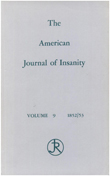Phenomenology and psychopathology of uncontrolled buying
Abstract
OBJECTIVE: Uncontrolled buying, defined by the presence of repetitive impulsive and excessive buying that leads to personal and familial distress, is a psychiatric disorder that has only recently been recognized. This review focuses on the prevalence, clinical features, and etiology of this disorder. METHOD: All published articles on the topic were collected and reviewed. The literature concerning the typology of normal consumerism was also reviewed. RESULTS: The prevalence of the disorder in the general population is reported to be 1.1%. The main clinical features of uncontrolled buying are impulsivity and repetition of buying, the invasive need to buy, unsuccessful attempts to control spending, and the existence of tangible negative consequences of buying (marked distress, interference with social or occupational functioning, or financial problems). Uncontrolled buying may be related to obsessive-compulsive disorder, depression, addiction, or impulsivity. CONCLUSIONS: In most cases, uncontrolled buying can be understood as "compensatory buying" that temporarily alleviates depressive symptoms and can thus be associated with the results of antidepressant treatment in cases in which uncontrolled buying is symptomatically associated with depression.
Access content
To read the fulltext, please use one of the options below to sign in or purchase access.- Personal login
- Institutional Login
- Sign in via OpenAthens
- Register for access
-
Please login/register if you wish to pair your device and check access availability.
Not a subscriber?
PsychiatryOnline subscription options offer access to the DSM-5 library, books, journals, CME, and patient resources. This all-in-one virtual library provides psychiatrists and mental health professionals with key resources for diagnosis, treatment, research, and professional development.
Need more help? PsychiatryOnline Customer Service may be reached by emailing [email protected] or by calling 800-368-5777 (in the U.S.) or 703-907-7322 (outside the U.S.).



